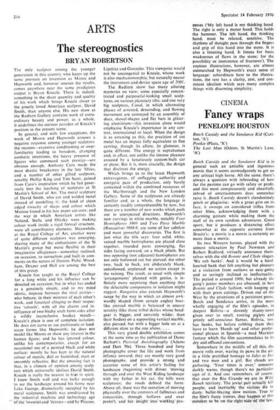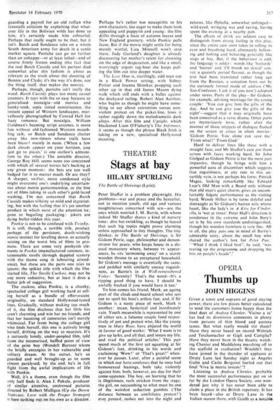CINEMA
Fancy wraps PENELOPE HOUSTON Butch Cassidy and the Sundance Kid (Carl- ton, 'A')
Pookie (Plaza, 'X') The Lost Man (Odeon, St Martin's Lane. `A')
Butch Cassidy and the Sundance Kid is in general such an amiable and ingenious
movie that it seems curmudgeonly to get on any critical high horse. All the same, there's always a question with inbreeding of how far the pastime can go with safety or profit, and this most conspicuously and cheerfully inbred of entertainments does somewhat raise it. Butch Cassidy doesn't clandestinely pinch or plagiarise: with a great grin on its face, it swoops on considered trifles from other films, acknowledging them with a charming gesture while making them the stuff of its own random adventures. Good sport; but it produces a distancing effect somewhat at the opposite extreme from Brecht's: a movie is a movie is certainly no more than a movie.
Its two. Western heroes, played with the utmost relaxation by Paul Newman and Robert Redford, virtually announce them- selves with the old Bonnie and Clyde slogan, `We rob banks'. And it would be a hard- hearted bank that felt anything but pleasure at a visitation from outlaws so easy-going and so savingly inclined to ineffectuality. The period is around 1900, but already the gang's junior members are obsessed, in best Bonnie and Clyde fashion, with keeping up with their press cuttings. Driven out of the West by the attentions of a persistent posse. Butch and Sundance arrive, in the most wholly engaging of the film's episodes, in deepest Bolivia—a slovenly shanty-town given over to small, rooting piglets and primly self-conscious llamas. Bolivia, too. has banks, but before robbing them they have to learn 'Hands up' and other profes- sional phrases in Spanish—a mad Mandan fantasy which the film accommodates to its dry and offhand conventions.
Somewhere in the middle of all this, the movie rolls over, waving its paws in the air. in a little prettified homage to Jules et Jim and two men and a girl. But clouds are gathering. 'Your times is over,' someone darkly warns, though there's no particular sign of it. And one remembers, of course. that over the Rio Grande we are in Wild Bunch territory. The jovial pair actually kill people; and inevitably the victims die in dusty, bullet-blazing slow motion. True to the film's fuzzy ironies, they happen at this rtit:ItAnt to be on the right tide of the law,
guarding a payroll for an old ruffian who forestalls criticism by explaining that what- ever life in the Bolivian wilds has done to him, it's certainly made him colourful. Perhaps that really ought to be that; but it isn't. Butch and Sundance take on a whole South American army for death in a sunlit market square. Pastiche can go no further than an unhappy—or at least lethal—and of course firmly frozen ending (the fact that the real Butch Cassidy and his partner died somewhat after this fashion is about as relevant as the truth about the shooting of Bonnie and Clyde; it's the way it's done, not the thing itself, that makes the movie).
Perhaps, though, pastiche isn't really the word. Butch Cassidy plays too many casual counters. It toys with the so easy because so generalised nostalgia—old movies and honky-tonk, sepia tinted reminiscence, the' instant appeal of Western landscapes, mar- vellously photographed by Conrad Hall for hazy romance. But nostalgia, William Goldman's beaming script assumes, is more fun without old-fashioned Western mumb- ling talk; so Butch and Sundance chatter away like new-timers whose trails have been blazed mainly in neon. (When a few dark clouds appear on your horizon, you just go to pieces,' is one outlaw's admoni- tion to the other.) The amiable director, George Roy. Hill, seems none too concerned with which of several horses he's backing at any' given moment: the bets are too well hedged for it to matter much. Or are they? A sharper, swifter, more condensed style might overcome one's underlying uncertain- ties about movie gamesmanship, or the fine art of films taking in each other's gold-laced washing. I'm not concerned that Butch Cassidy makes villainy so mild and ingratiat- ing, but with the feeling that it's yet another product in which most of the attention hay gone to beguiling packaging: jokers are dying bullet-ridden this year.
Pookie is not to be confused with Twinky. It is still, though, a terrible title, product perhaps of the persistent, death-wishing movie instinct for levelling down, or actually seizing on the worst bits of films to pro- mote. There are some very pookyish ele- ments in Pookie (manufactured cuteness, in- terminable strolls through dappled scenery with the theme song in labouring attend- ance), but these are the parts one tries to ignore; the spikier title with which the film started life, The Sterile Cuckoo, may not be any more seductive, but at least it does a better job of suggestion.
The cuckoo, alias Pookie, is a chunky, spectacled college girl working hard at sell- ing herself as a bundle of effervescent originality, on standard Hollywood-tested lines. Gradually, without making too much of it, the film discloses that her little lies aren't charming and win her no friends, and that her haunting of cemeteries isn't merely whimsical. Far from being the college girl who finds herself, this one is actively losing herself, drifting on the way to neurosis. It's a curiously lonely, under-peopled film, told from the mesmerised, baffled point of view of the prim boy (Wendell BUrton) whom she briefly entangles in her vulnerable and solitary dream. At the outset, he's so guarded and well brought-up as to seem almost paralysed; by the end, he's in full flight from the awful implications of life with Pookie.
Well, it's a theme, even though the film only half finds it. Alan J. Pakula, producer of similar attentive, unstressed pictures directed by Robert Mulligan (Up the Down Staircase, Love with the Proper Stranger) is hgre Making out on his own as a director.
Perhaps he's rather too, susceptible to his own characters, too eager to make them look appealing and puppyish and young: the film drifts through a haze of autumn leaves and New England greenery, while Pookie pulls faces. But if the movie might settle for being merely wistful, Liza Minnelli won't stop there. Judy Garland's daughter is already discovering her mother's talent for clowning on the edge of desperation, and like a small, worryingly urgent tug-boat she keeps pull- ing the film out into deeper water.
The Lost Man is, startlingly, odd man out in a Black Power setting, with Sidney Poitier and Joanna Shimkus propping each other up in that old James Mason dying walk which still ends with a bullet against the dockyard railing. Robert Alan Aurthur, who begins as though he might have some- thing to say about extremism versus non- violent protest on the picket-line, loses it rather rapidly down the melodramatic dark alleys. After this film and Uptight, which blackened Liam O'Flaherty's The Informer, it seems as though the phrase Black Irish is taking on a new, specialised Hollywood meaning.



































 Previous page
Previous page